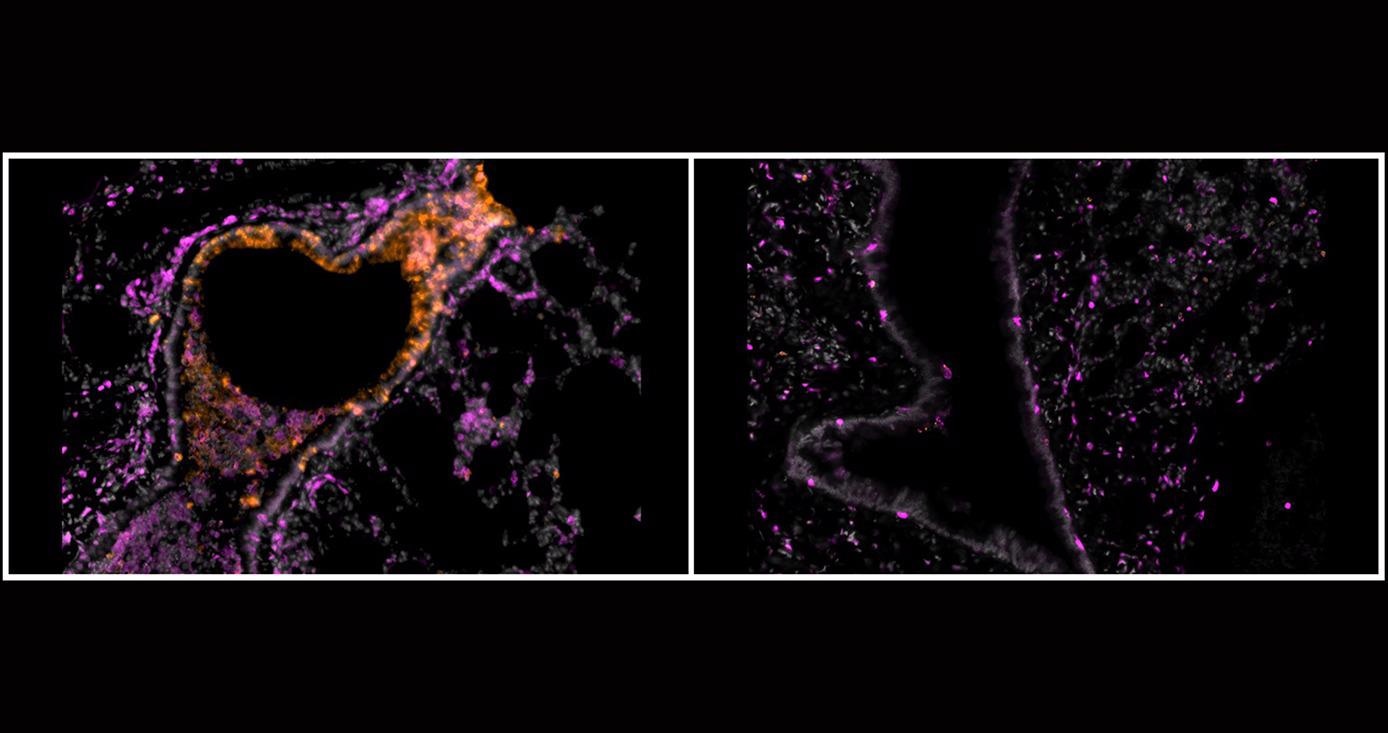May 27 2021
Scientists from the University of Pittsburgh School of Medicine have demonstrated that inhalable nanobodies can prevent and cure severe COVID-19 in hamsters by targeting the spike protein of the SARS-CoV-2 coronavirus. The article was recently published in the Science Advances journal.
 A new study published in Science Advances found that inhalable nanobodies targeting the spike protein of the SARS-CoV-2 coronavirus can prevent and treat severe COVID-19 in hamsters. Here, bronchioles of hamsters sick with COVID-19 untreated (left) and treated with inhalable nanobodies (right) show the impact of the approach. Image Credit: Nambulli et al., Science Advances.
A new study published in Science Advances found that inhalable nanobodies targeting the spike protein of the SARS-CoV-2 coronavirus can prevent and treat severe COVID-19 in hamsters. Here, bronchioles of hamsters sick with COVID-19 untreated (left) and treated with inhalable nanobodies (right) show the impact of the approach. Image Credit: Nambulli et al., Science Advances.
Nanobodies are analogous to monoclonal antibodies but are more stable, smaller in size, and cheaper to create. This is the first-ever study in which these nanobodies were tested for inhalation therapy against the ongoing COVID-19 infections in a pre-clinical model.
The researchers demonstrated that low doses of an aerosolized nanobody, called Pittsburgh inhalable Nanobody-21 (PiN-21), protected hamsters against the significant weight loss that is usually linked to severe COVID-19 infection and also decreased the number of infectious virus particles in the lungs, throats, and nasal cavities of the animals by a million times. This is in contrast to the placebo therapy with a nanobody that does not neutralize the coronavirus.
By using an inhalation therapy that can be directly administered to the infection site—the respiratory tract and lungs—we can make treatments more efficient. We are very excited and encouraged by our data suggesting that PiN-21 can be highly protective against severe disease and can potentially prevent human-to-human viral transmission.
Yi Shi, Study Co-Senior Author and Assistant Professor of Cell Biology, University of Pittsburgh
Shi and collaborators have previously identified a huge collection of over 8,000 high-affinity SARS-CoV-2 nanobodies. Based on this collection, the investigators chose Nb21—an ultrapotent nanobody—and bioengineered it into a trimeric form to boost its antiviral activity even more.
According to the team’s review of published research works, the PiN-21, thus obtained, is by far the most powerful antiviral nanobody to be ever discovered.
The experiments demonstrated that the PiN-21 nanobody had protective properties when it was injected intranasally during the infection. While the placebo-treated hamsters lost up to 16% of their initial body weight after seven days of infection, animals involved in the PiN-21 treatment group did not lose any body weight. In the case of the average adult human, the rate of weight loss would be equivalent to losing about 20 pounds in a week.
What is more impressive is the fact that the inhalation of aerosolized nanobodies at an extremely low dose decreased the number of infectious virus particles present in the lung tissue by as much as six times.
Animals that were injected with aerosolized PiN-21 nanobodies had a lower degree of inflammation and milder variations in the lung structure when compared to placebo-treated animals.
To deliver therapeutics through aerosolization, the investigators need to resolve many technical barriers—tiny particle aerosols have to penetrate deep into the lung—and treatment particles have to be sufficiently small so that they do not bind together but, at the same time, should be sufficiently strong to tolerate the extreme pressure needed to suspend them in the atmosphere.
The PiN-21 nanobodies, which are roughly four times smaller than normal monoclonal antibodies with remarkably high stability, are ideal for the task. These nanobodies are also relatively cheaper to create and can be quickly produced to instantly adapt to the shape-shifting coronavirus.
COVID-19 is now a preeminent disease of the 21st century. Delivering the treatment directly to the lungs can make a big difference for our ability to treat it.
Doug Reed, Study Co-Author and Associate Professor of Immunology, University of Pittsburgh
The investigators pointed out that the vaccines and nanobodies are complementary and do not contend with each other. Vaccines continue to remain the most optimal tool to prevent the coronavirus from spreading from one person to the next; however, nanobodies will be valuable for treating individuals who are already sick and those who are unable to receive the vaccine for other medical reasons.
Potential early preclinical data, together with the team’s elaborate know-how about rapidly detecting drug-quality nanobodies, indicate that the new approach can offer a cost-effective and simple therapeutic alternative to manage the ongoing COVID-19 pandemic.
This work is the result of experts in nanobody production, infectious disease and aerobiology working closely together. At the University of Pittsburgh Center for Vaccine Research, we don’t just talk about ideas, we actually make them come to life.
Paul Duprex, Study Co-Senior Author and Director, University of Pittsburgh
Other authors of the article include Sham Nambulli, Natasha Tilston-Lunel, Linda J. Rennick, and William Klimstra, all from the Pitt Center for Vaccine Research; Yufei Xiang from the Department of Cell Biology at the University of Pittsburgh; Zhe Sang from the Pittsburgh–Carnegie Mellon University Program in Computational Biology; and Nicholas Crossland from Boston University.
Journal Reference:
Nambulli, S., et al. (2021) Inhalable Nanobody (PiN-21) prevents and treats SARS-CoV-2 infections in Syrian hamsters at ultra-low doses. Science Advances. doi.org/10.1126/sciadv.abh0319.
Source: https://www.pittwire.pitt.edu/